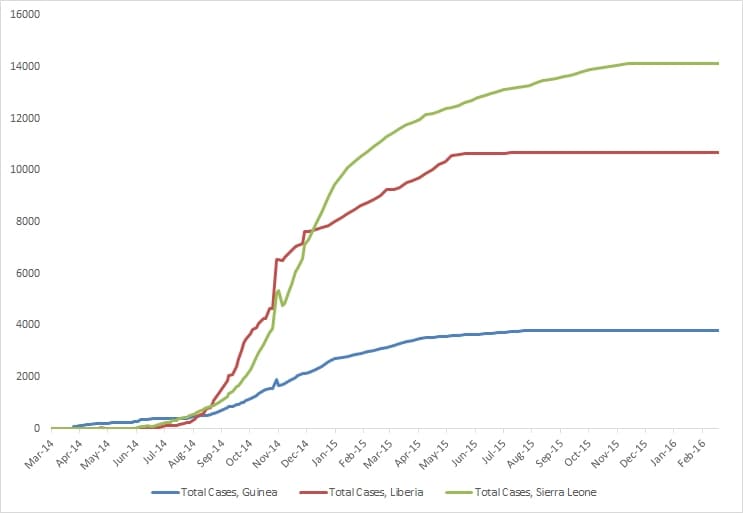Beginning in March 2014, multiple West African countries began to experience the largest and deadliest Ebola outbreak recorded. Despite early warnings, international global health leaders did not unanimously declare the spread of the viral disease of Ebola hemorrhagic fever an emergency, contributing to more than 28,000 estimated infections and over 11,000 deaths. Guinea, a country with a population of 11.8 million people, was among the three West African countries most severely impacted.
Since the end of December 2015, Guinea and its neighbors have been declared Ebola-free. Humanitarian assistance is beginning to wane in many places, as longer-term development support rises. Yet while efforts in Guinea focus on immediate survival, health systems strengthening, and economic development - all of which are important for elevating the status of one of the poorest countries in the world - questions remain about the situation that girls and women face, and the ways in which their health and their rights have been affected.
This summer, with the generous support of the Women and Public Policy (WAPPP) Summer Internship Program, I will be conducting independent research in the Republic of Guinea as an intern with the Brigham and Women's Hospital (BWH). Under the guidance of Dr. Paul E. Farmer, Chief of the Division of Global Health Equity at BWH, I will focus my research on understanding problems affecting young women in Guinea following the 2014-15 Ebola crisis. Findings from my summer research will be shared with BWH affiliates and the Office of the President, with the aim of strengthening health systems activities following the Ebola epidemic. This work compliments my ongoing dissertation research, which quantitatively and qualitatively assesses how girl child marriage affects the health and development of women and their children in sub-Saharan Africa.
 |
| From the Centers for Disease Control, 2016 |
This summer, with the generous support of the Women and Public Policy (WAPPP) Summer Internship Program, I will be conducting independent research in the Republic of Guinea as an intern with the Brigham and Women's Hospital (BWH). Under the guidance of Dr. Paul E. Farmer, Chief of the Division of Global Health Equity at BWH, I will focus my research on understanding problems affecting young women in Guinea following the 2014-15 Ebola crisis. Findings from my summer research will be shared with BWH affiliates and the Office of the President, with the aim of strengthening health systems activities following the Ebola epidemic. This work compliments my ongoing dissertation research, which quantitatively and qualitatively assesses how girl child marriage affects the health and development of women and their children in sub-Saharan Africa.
As a doctoral student, I have had several opportunities to conduct and strengthen research competencies, which I will use to implement this summer project. As a WAPPP Fellow, I will now have a unique opportunity to build additional skills in conducting and disseminating policy-relevant work, an important component of my minor in program leadership. Research is not an easy activity, and, at times, can be tedious, frustrating, and, frankly, just hard. Research can also be exciting, unexpected, and can lead to groundbreaking findings that have the ability to impact people around the world.
I look forward to sharing updates on my summer abroad conducting research "in the field," and thank both WAPPP and the Committee on African Studies for their support!
I am so proud of you!!!
ReplyDeleteThank you Kali! I've come along way since the days of taking your course on cultural anthropology! :) Look forward to keeping you updated!
ReplyDelete